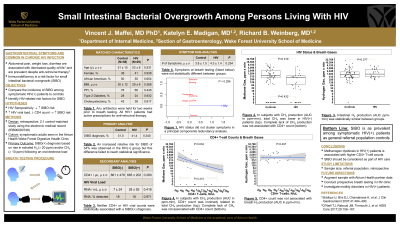Back


Poster Session D - Tuesday Morning
Category: Small Intestine
D0635 - Small Intestinal Bacterial Overgrowth Among Persons Living With HIV
Tuesday, October 25, 2022
10:00 AM – 12:00 PM ET
Location: Crown Ballroom

Has Audio

Vincent J. Maffei, MD, PhD
Wake Forest University School of Medicine, Atrium Health Wake Forest Baptist
Winston-Salem, NC
Presenting Author(s)
Vincent J. Maffei, MD, PhD, Katelyn E. Madigan, MD, Richard B. Weinberg, MD
Wake Forest University School of Medicine, Atrium Health Wake Forest Baptist, Winston-Salem, NC
Introduction: Chronic gastrointestinal symptom management remains a priority among persons living with HIV (PLWH) despite advances in HIV antiretroviral therapy (ART). Diarrhea, abdominal discomfort, and weight loss are commonly reported by PLWH and negatively impact quality-of-life. In longitudinal studies, these symptoms remain prevalent over follow-up despite ART initiation, suggesting a small bowel pathology not addressed by HIV suppressive therapy. Small intestinal bacterial overgrowth (SIBO) manifests similar symptomatology and is associated with immunodeficiency, yet data on SIBO/HIV co-prevalence are lacking in the literature. We hypothesized that HIV infection increases the risk for SIBO and that markers of HIV disease progression further enhance SIBO risk.
Methods: In a pilot, retrospective cohort study, we abstracted electronic medical record data from symptomatic patients who underwent hydrogen-dextrose breath testing (HBT) for evaluation of SIBO at the Atrium Health Wake Forest Baptist Digestive Health Clinic. We included adults with an established HIV diagnosis (N=29) prior to HBT. Controls were matched 2:1 (N=58) for relevant demographic and historical factors.
Results: In the HIV group, viral RNA was < 20 copies/mL in 89% (N=25/28) and peripheral CD4+ counts >300/µL in 96% (N=22/23) within 3-6 months of HBT. A SIBO diagnosis was made in 41.4% of the HIV group compared to 31.0% of controls (RR: 1.33, P=.340). Bloating, excessive gas, and abdominal cramping were the three most common symptoms in each group. Symptoms failed to cluster by group in a principle-components redundancy analysis (P=.286). Breath methane was reduced in the HIV vs. control group (P=.019) while hydrogen was similar (P=.577). In the HIV group, mean viral RNA and CD4+ counts were 7 and 28 copies/mL (P=.418) and 861 and 665 cells/µL (P=.280) among SIBO(-) and SIBO(+) subjects, respectively. Breath methane was inversely associated with CD4+ counts (P=.004) and hydrogen was not (P=.497).
Discussion: In this pilot, HIV infection was controlled and trended towards an enhanced SIBO risk without reaching statistical significance. Decreased breath methane was observed among PLWH with clinically stable CD4+ counts, suggesting that small bowel dysbiosis accompanies controlled infection. In this limited sample, SIBO was as prevalent in symptomatic PLWH as in controls. An awareness of SIBO among PLWH may broaden therapeutic options for chronic symptom control.
Disclosures:
Vincent J. Maffei, MD, PhD, Katelyn E. Madigan, MD, Richard B. Weinberg, MD. D0635 - Small Intestinal Bacterial Overgrowth Among Persons Living With HIV, ACG 2022 Annual Scientific Meeting Abstracts. Charlotte, NC: American College of Gastroenterology.
Wake Forest University School of Medicine, Atrium Health Wake Forest Baptist, Winston-Salem, NC
Introduction: Chronic gastrointestinal symptom management remains a priority among persons living with HIV (PLWH) despite advances in HIV antiretroviral therapy (ART). Diarrhea, abdominal discomfort, and weight loss are commonly reported by PLWH and negatively impact quality-of-life. In longitudinal studies, these symptoms remain prevalent over follow-up despite ART initiation, suggesting a small bowel pathology not addressed by HIV suppressive therapy. Small intestinal bacterial overgrowth (SIBO) manifests similar symptomatology and is associated with immunodeficiency, yet data on SIBO/HIV co-prevalence are lacking in the literature. We hypothesized that HIV infection increases the risk for SIBO and that markers of HIV disease progression further enhance SIBO risk.
Methods: In a pilot, retrospective cohort study, we abstracted electronic medical record data from symptomatic patients who underwent hydrogen-dextrose breath testing (HBT) for evaluation of SIBO at the Atrium Health Wake Forest Baptist Digestive Health Clinic. We included adults with an established HIV diagnosis (N=29) prior to HBT. Controls were matched 2:1 (N=58) for relevant demographic and historical factors.
Results: In the HIV group, viral RNA was < 20 copies/mL in 89% (N=25/28) and peripheral CD4+ counts >300/µL in 96% (N=22/23) within 3-6 months of HBT. A SIBO diagnosis was made in 41.4% of the HIV group compared to 31.0% of controls (RR: 1.33, P=.340). Bloating, excessive gas, and abdominal cramping were the three most common symptoms in each group. Symptoms failed to cluster by group in a principle-components redundancy analysis (P=.286). Breath methane was reduced in the HIV vs. control group (P=.019) while hydrogen was similar (P=.577). In the HIV group, mean viral RNA and CD4+ counts were 7 and 28 copies/mL (P=.418) and 861 and 665 cells/µL (P=.280) among SIBO(-) and SIBO(+) subjects, respectively. Breath methane was inversely associated with CD4+ counts (P=.004) and hydrogen was not (P=.497).
Discussion: In this pilot, HIV infection was controlled and trended towards an enhanced SIBO risk without reaching statistical significance. Decreased breath methane was observed among PLWH with clinically stable CD4+ counts, suggesting that small bowel dysbiosis accompanies controlled infection. In this limited sample, SIBO was as prevalent in symptomatic PLWH as in controls. An awareness of SIBO among PLWH may broaden therapeutic options for chronic symptom control.
Disclosures:
Vincent Maffei indicated no relevant financial relationships.
Katelyn Madigan indicated no relevant financial relationships.
Richard Weinberg indicated no relevant financial relationships.
Vincent J. Maffei, MD, PhD, Katelyn E. Madigan, MD, Richard B. Weinberg, MD. D0635 - Small Intestinal Bacterial Overgrowth Among Persons Living With HIV, ACG 2022 Annual Scientific Meeting Abstracts. Charlotte, NC: American College of Gastroenterology.
